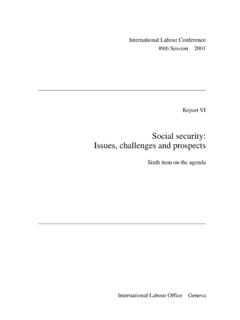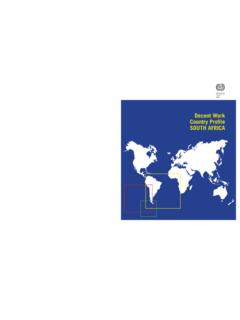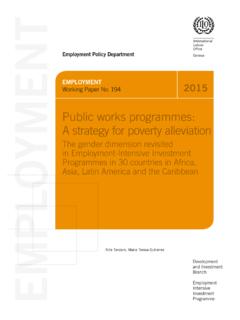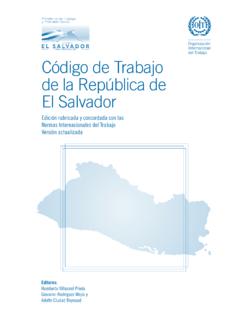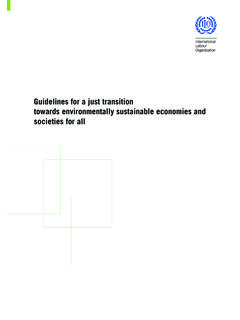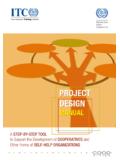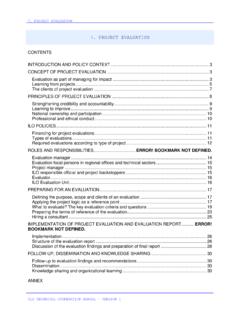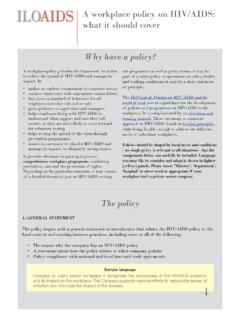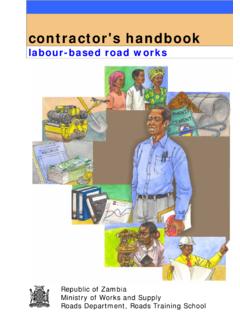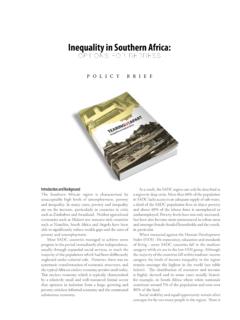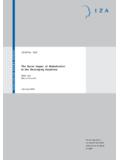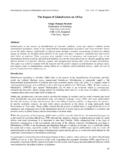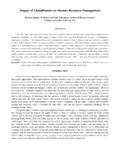Transcription of II. GLOBALIZATION AND ITS IMPACT
1 Part II Page 11 Friday, January 23, 2004 12:53 PM. II. GLOBALIZATION AND ITS. IMPACT . Views and perceptions Common ground Africa Arab world Asia Latin America and the Caribbean Transition countries of Europe and Central Asia Western Europe and North America Business, labour and civil society GLOBALIZATION : Its nature and IMPACT Introduction Key characteristics of GLOBALIZATION The institutional context The IMPACT of GLOBALIZATION A fair GLOBALIZATION : Creating opportunities for all Part II Page 12 Friday, January 23, 2004 12:53 PM. Views and perceptions Common ground Africa Arab world Asia Latin America and the Caribbean Transition countries of Europe and Central Asia Western Europe and North America Business, labour and civil society GLOBALIZATION 62. A key priority for the Commission was to see GLOBALIZATION from a wide range from a wide range of perspectives, in regions throughout the world: how it had affected people's of perspectives lives; what hopes, fears and concerns it had aroused; and what action people believe should be taken to expand its opportunities and reduce its insecurities.
2 63. To achieve this, we launched a wide-ranging programme of dialogues and con- sultations at national, regional and global levels. Participants included over 2000. decision-makers and social actors involved in GLOBALIZATION issues, among them government ministers and administrators, local politicians and parliamentarians, national leaders of workers' and employers' associations, representatives of civil society and religious leaders, organizations of women and indigenous peoples, academics and journalists. 2 The dialogues were designed to be interactive and participants exchanged ideas both among themselves and with Commissioners. Views and perceptions 64. Although the participants were not intended to be representative of public opinion as a whole, these dialogues have helped us to see GLOBALIZATION through the eyes of people. 3 There was broad recognition of the benefits of GLOBALIZATION , but a clearly critical strand of opinion ran through the dialogues.
3 We present this brief summary, not because we agree with everything that was said indeed there were divergent or contradictory views among different participants but because they help us understand the questions that are being posed, the concerns that are being expressed, the interests at stake, and the values and goals to which people sub- 2 Altogether some 26 national and regional dialogues were held. In addition to regional consultations for Africa, the Arab States, Asia, Europe, Latin America and the Caribbean, national dialogues and con- sultations were held in the following countries: Argentina, Brazil, Chile, China, Costa Rica, Egypt, Fin- land, Germany, India, Mexico, Philippines, Poland, Russia, Senegal, South Africa, Tanzania, Thailand, Uganda, the United States, and Uruguay. Nine special consultations were organized to hear the views of international business, labour, and civil society groups.
4 More details are given in an annex to the Report. To supplement this information, we have also considered the results of some opinion polls carried out by other organizations. 3 Full reports of the dialogues are available at: 12 A fair GLOBALIZATION : Creating opportunities for all Part II Page 13 Friday, January 23, 2004 12:53 PM. scribe. Above all they have underlined the importance of a better process of dialogue among different social actors if a fairer GLOBALIZATION is to be constructed. Common ground 65. The views and perceptions of people depend on who they are, where they live Kaleidoscope of and what they possess. But in the kaleidoscope of opinions that emerged from the opinions but dialogues there was also much common ground. much common ground 66. From almost everywhere came a sense of the power of GLOBALIZATION , whether driven by technology, economics or politics.
5 We were sleeping on the shore when a big wave came , said a participant in the dialogue in Egypt. GLOBALIZATION could be frightening, stimulating, overwhelming, destructive or creative, depend- ing on one's point of view. 67. There was a widespread sense of instability and insecurity. In the Costa Rica dialogue a participant said, There is a growing feeling that we live in a world highly vulnerable to changes we cannot control; a growing sense of fragility among ordinary people, countries and entire regions . Unstable global financial systems had devastating effects. In all parts of the world there were voices calling for stronger systems of social protection and income security. 68. Another common concern was the IMPACT of GLOBALIZATION on culture and IMPACT of identity. Some saw it as threatening traditional institutions such as the family GLOBALIZATION and the school , or threatening the way of life of whole communities.
6 Others saw on culture benefits in overturning traditional ways and developing modern attitudes. There and identity was frequent reference to the implications for gender equality, both positive and negative. 69. The one issue which came to the fore time and time again was employment Employment and and livelihoods. While people largely favour more openness and interconnection livelihoods between societies, they are much less positive when asked about the IMPACT on their jobs and incomes. 4 A participant in the Philippines dialogue said, There is no point to a GLOBALIZATION that reduces the price of a child's shoes, but costs the father his job . There was frequent reference to the difficulties faced by small enterprises in taking advantage of GLOBALIZATION and yet that is where most employment is created. The rural and informal economies remain on the margins, and the result is persistent poverty.
7 Others were concerned with the loss of jobs as a result of industrial restructuring in the face of competitive global markets, and the downward pressures on conditions of work and workers' rights in Europe and North America as well as in middle-income and transition countries. 70. Since GLOBALIZATION is only one of many factors affecting people's lives, the dia- Markets and logues sparked broader debate on the role of the market in society and how the global rules needs and aspirations of people can be expressed and met in their own com- munities. It was widely argued that progress was impeded by the unfair rules of the 4 Multi-country opinion polls reach similar conclusions. For example, an average 48% of people polled by Environics International in seven countries thought that GLOBALIZATION was good for quality of life and economic development, but only 38% thought the same about jobs and workers' rights (full survey report in Global Issues Monitor 2002, Toronto, Environics International, May 2002).
8 Another multi-country survey found that people generally view the growth in foreign trade, global communication and international popular culture as good for them and their families while at the same time finding that many aspects of their lives including some affected by GLOBALIZATION are getting worse , including the availability of good-paying jobs . (See Views of a changing world, Washington DC, the Pew Research Center for the People and the Press, June 2003, ). Views and perceptions 13. Part II Page 14 Friday, January 23, 2004 12:53 PM. global economy. These were biased in favour of the rich and powerful and neglected the social IMPACT of economic policies. The adverse effects were some- times strikingly similar in different parts of the world. For instance, the damage done by agricultural subsidies was illustrated by identical complaints in the Brazil and Tanzania dialogues: that the import of European powdered milk was crowding out demand for their domestic milk, while at the same time introducing an inferior product.
9 71. However, fair rules do not automatically lead to a fair result. Efforts were needed to help those in a weaker position to jump on the bandwagon of devel- opment . The current agenda was considered to be too focused on trade and investment, and not enough on human rights and the environment, partly due to a democratic deficit at the international level. 72. There was widespread agreement on the need for a renewed role for the State, built on the rule of law and democratic institutions, and working in partnership with other social actors. While the concept of an all-embracing State has been dis- credited, GLOBALIZATION had weakened the State too much. In order to respond effectively to GLOBALIZATION the State needed to be able to develop national capacities, regulate economic activity, promote equity and fairness, provide essen- tial public services and participate effectively in international negotiations.
10 Need for 73. A recurring theme was that to take advantage of the opportunities of global- investment in ization, people and countries had to invest in education, skills and technological education and capabilities across the board. Education systems needed reform and illiteracy had skills to be tackled. Migration and 74. Migration was another widespread concern, for countries of in-migration and regional out-migration alike. In many low-income countries there was criticism of the bar- integration riers to broad-based migration to industrialized countries, and concern about the brain drain , which undermined efforts to build national capabilities. Migrants from all regions, particularly women, were often driven into an illegal economy in countries of destination, leaving them vulnerable to exploitation. A fairer frame- work for the movement of people was essential, and in the European regional dialogue it was argued that any policy of restriction should be linked to a policy of trade liberalization and development cooperation.
